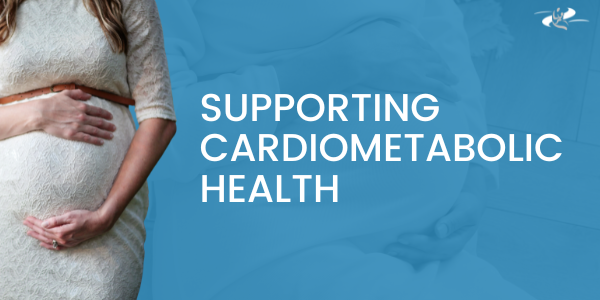
Cardiometabolic health is a term you may have heard before. It refers to the risk factors for cardiovascular diseases such as high blood pressure, high cholesterol, and high blood sugar. Cardiometabolic conditions such as type 2 diabetes and pre-diabetes are often characterized by a cluster of these metabolic risk factors that can increase your risk of heart attack or stroke.
According to the World Health Organization (WHO), cardiometabolic diseases are the number one cause of death worldwide. Cardiometabolic health is an important consideration during pregnancy because it can affect the mother and baby.
Contributing Factors to CMDs
There is an ever-increasing amount of research revealing the importance of maternal health on pregnancy and childhood development outcomes.
Several factors contribute to cardiometabolic health during prepregnancy and pregnancy, including:
Sedentary Lifestyle
Women’s lifestyle habits before and during pregnancy can impact the health of both mother and baby. Efforts to improve cardiometabolic health should begin before conception and continue throughout pregnancy. Research has demonstrated that sedentary lifestyles, poor nutrition, obesity, stress/anxiety, genetic predisposition, and chronic disease (e.g., diabetes) contribute to cardiometabolic health during pregnancy.
Healthy lifestyle habits before and during pregnancy can result in better birth outcomes including decreased risk of maternal death and complications associated with preterm birth. In addition to improved outcomes for mothers, a healthy lifestyle reduces the risk of congenital heart defects in babies.
Sedentary lifestyles are one of the most modifiable risk factors for pregnant moms and their unborn children. Examples include watching TV or using a computer for long stretches at a time.
Obesity
Obesity also contributes to the development of type 2 diabetes, increasing the chance of preeclampsia, congenital disabilities, and preterm delivery.
Obesity increases the likelihood of complications in labor, Cesarean Section delivery, stillbirth, low Apgar scores, and neonatal intensive care unit admissions.
Poor Nutrition
Consuming foods high in fat, sugar, cholesterol, or salt increases the risk for obesity and heart disease in both mothers and infants.
Genetic Predisposition
Additionally, genetics can play an important role in developing chronic diseases later in life. If a mother has a genetic predisposition for certain diseases, she will also have an increased risk of developing them due to genetic inheritance. Understanding genetics is important when determining how lifestyle choices will affect future generations of children or grandchildren who may inherit those genes.
CMDs Risk Factors
There are several risk factors associated with poor CMDs:
Cardiometabolic health can impact fertility, making it harder for a woman to get pregnant.
Poor cardiometabolic health can lead to a higher risk for maternal complications like gestational diabetes, preeclampsia, and high blood pressure during pregnancy.
Poor cardiometabolic health increases the likelihood of complications during pregnancy or delivery. It also increases the chance of premature birth and low birth weight in newborns.
In addition to impacting their short-term health, these issues can have long-term effects on children’s health as they grow into adults.
Symptoms
Not all cardiometabolic health disorders cause symptoms. However, some symptoms associated with these conditions include:
- Fatigue
- Blurred vision
- Tingling or numbness in fingers or toes
- Rapid weight gain or loss
- Extreme thirst or hunger
Ways to Support Better CMDs Health Pre-pregnancy and During Pregnancy
Here is a list of ways to enhance your cardiometabolic health:
- Maintain a healthy weight
- Exercise regularly
- Eat a fiber-rich diet
Cardiovascular disease and diabetes can be a serious concern for women who have had an unhealthy cardiometabolic profile before becoming pregnant or developing any of these problems during their pregnancy.
It is important to maintain good cardiometabolic health before you become pregnant and throughout your pregnancy to decrease your risk for pregnancy complications or long-term health problems. We are here to help. Learn more about Lescale Maternal Medicine here.
